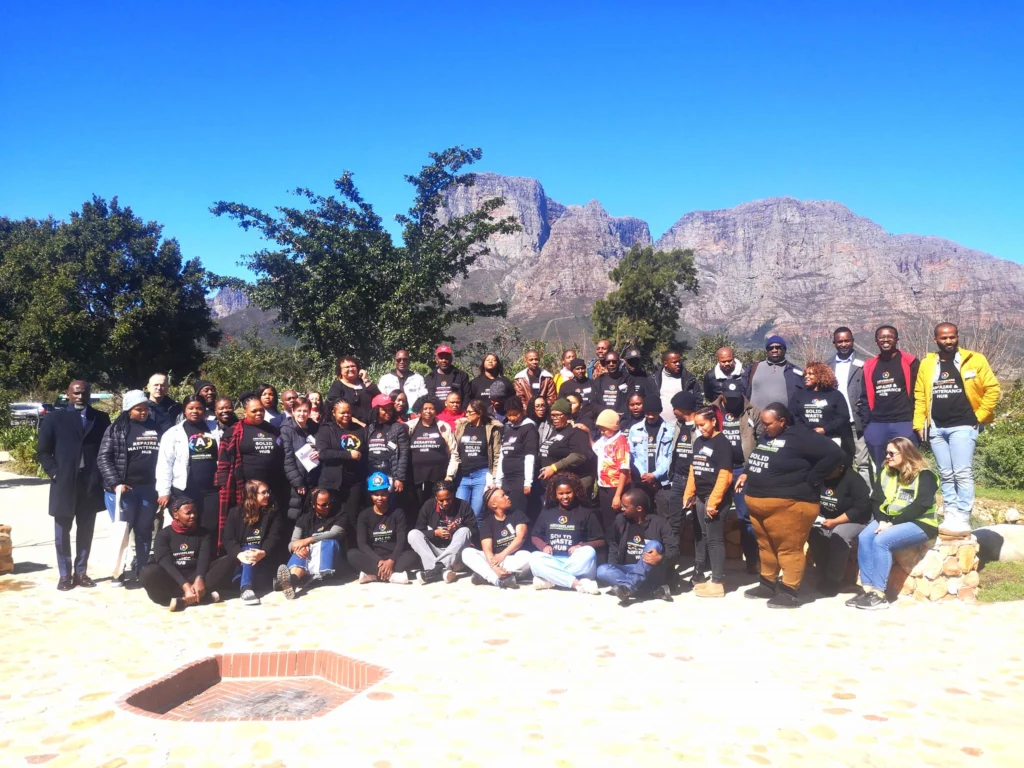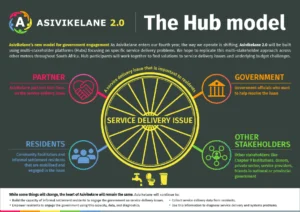Collaborating for Responsiveness? Asivikelane’s Evolving Approach to Community Engagement with Government to Improve Service Delivery in South Africa – Part 1

In 2020, during the COVID pandemic, a coalition of South African civic organizations launched the Asivkelane (‘Let’s protect one another’ in isiZulu) campaign. Asivikelane created a platform across South Africa’s eight largest cities for urban informal settlement residents to engage with government on basic water and sanitation (WASH) service delivery needs. To date, Asivikelane has contributed to thousands of service delivery improvements reaching millions of informal settlement residents. Asivikelane is part of the SPARK program supported by the International Budget Partnership.
In two blogs, we will explore Asivikelane’s approach to engaging collaboratively with government to improve responsiveness. First, the Asivikelane approach and how it evolved, and second, the lessons and insights can be drawn from Asivikalene about collaborative approaches to government responsiveness.
What does it take to strengthen responsiveness for service delivery in informal settlements?
According to the United Nations Human Settlements Programme, as of 2022, 10 million South Africans were living in informal settlements or slums, lacking adequate shelter, land tenure security, and/or essential services, an increase of 1.5 million over the previous decade. Although most informal settlement residents in South Africa have a minimum of access to WASH services, a large majority of these are communal and inadequate for household needs. In addition to deep racial divides, there is a significant gender dimension to inadequate WASH services, with women spending significant time in collecting water for household use and reporting feelings of insecurity about using communal services at night. Finally, WASH infrastructure is often in a state of disrepair, with only 20% of informal settlement residents reporting that broken water taps and toilets are repaired in a month or less; nearly half said that repairs never happen.
These figures demonstrate the degree of exclusion faced by informal settlement residents in South African by local governments and service providers (often private businesses) in the existing system that determines how public resources are used for public goods and services to whom, or public resource governance system. This represents a vicious cycle of low responsiveness by local authorities to informal settlements, resulting in disillusionment, disengagement and/or frustration. Asivikelane took on the challenges of shifting this equilibrium towards a more positive and mutually-reinforcing cycle of engagement and responsiveness. However, the factors holding the negative cycle in place were significant and deeply rooted, thus Asivikelane was attempting to bring about a systemic change in urban public resource governance across South Africa.
Asivikelane’s core driver was building the capacities of informal settlement residents to generate credible evidence of service delivery shortfalls and engaging relevant government actors based on this evidence, both directly and through established public participation forums. At the center of this approach was the role of community facilitators. These individuals, most of whom were women, lived in informal settlements and generated ongoing evidence on the status of WASH services in their community, through the Asivikelane survey. The survey had a clear and consistent methodology that allowed it to generate credible evidence on WASH services and gaps. This participatory data collection process allowed Asivikelane to provide a real-time snapshot of overall WASH services across informal settlements in each of South Africa’s eight biggest cities, as well as targeted information about specific service delivery failures.
Asivikelane’s CSO members complemented the survey data with additional technical research on service delivery challenges, and the underlying systemic bottlenecks contributing to these, to generate further understanding of problems and solutions. Finally, the campaign leveraged social and traditional media coverage of service delivery performance across the eight cities to incentivize government action, including highlighting positive results.
Asivikelane’s members expected that these multiple and complementary actions would contribute to shifting the attitudes, capacities, and ultimately behaviors, of relevant government actors, leading them to take actions that were more responsive to the priorities and needs of informal settlement residents. For more meaningful and sustainable shifts in the public resource governance system for informal settlements, multiple government actors would need to shift their behaviors and take significant actions to both address structural bottlenecks and change the relationship between city governments and informal settlements.
Asivikelane’s community facilitators and CSO members undertook widespread engagement with the diverse government actors responsible for effective and responsive public services, from local officials to managers and directors in each city to relevant national institutions like the Treasury and Auditor General. In particular, community facilitators with the support and backing of the Asivikelane campaign, and credible and targeted evidence and understanding of public services, improved their ability to access and engage with front-line authorities.
Over time, many government actors’ attitudes, capacities and behaviors did shift, leading to significant improvements in services to many informal settlements, as well as more systemic changes across the eight cities and several national-level institutions. However, many government actors also remained or even became less responsive to the campaign, and messy political dynamics in a number of cities made it difficult to undertake meaningful engagement and see consistent and meaningful responsiveness. To respond to these dynamics, the Asivikelane campaign evolved over time.
Asivikelane’s evolving approach to government responsiveness
Initially, at the onset of the COVID crisis, Asivikelane’s focus was on providing real-time and comparative WASH service delivery information, which appeared to tap into incentives of city government actors to be, and be seen to be, responsive given the unfolding health crisis. During this initial period, the credibility of the data Asivikelane was producing, and of the campaign itself, was established, enabling greater access and interest by diverse government actors.
Later, Asivikelane engagements intensified, with relatively more emphasis on accessing and building relationships with government actors, and relatively less on the service delivery data alone. Engagement between Asivikelane community facilitators and front-line service providers and bureaucrats continued to enable many service delivery improvements, while also continuing to reveal underlying bottlenecks in the public resource governance system to more meaningful and sustainable changes. Asivikelane members continued to establish and/or deepen relationships with other government actors, providing them with information and analysis to inform actions to address structural challenges to services. Engagement between municipal actors and Asivikelane stakeholders and data became more normalized, and in some cases institutionalized, including Asivikelane’s support for informal settlement residents engaging in several city budgeting processes through their official participation channels.
Finally, starting in 2023, Asivikelane began to shift the campaign’s approach and modality to ‘hubs’ focused on specific geographies, services and stakeholders. This was largely due to two reinforcing factors:
- Despite notable gains, there was continued unevenness, and some declines, in access to and responsiveness by city decision makers. This was often related to challenging political dynamics in several cities, undermining the opportunity to engage and address the underlying obstacles to improved service delivery.
- It became more apparent that diverse actors needed to be brought together to address systemic issues, and that Asivikelane was well positioned to convene these stakeholders to work collaboratively.

The common thread across Asivikelane’s evolving approach has been to strengthen the enabling conditions for, and to directly facilitate, a collaborative approach to improving the responsiveness of government actors to the WASH service delivery priorities and needs of informal settlements. As noted, this generally involved disrupting and shifting a vicious cycle of low responsiveness and community frustration and disengagement. The lack of government responsiveness in the provision of public services had generated increasingly widespread, and often violent, protests in South Africa. Thus, Asivikelane’s collaborative approach represented a significant departure from how many communities were responding. As highlighted above, there were positive outcomes of this approach, but it was neither straightforward nor automatic, and also entailed certain risks.
We will further articulate and unpack these risks, rewards and lessons in the following blog.
Meet the Explorers
Join the Governance Explorers
We are bringing together a global network of people eager to rethink governance and influence local, national and global debates.



